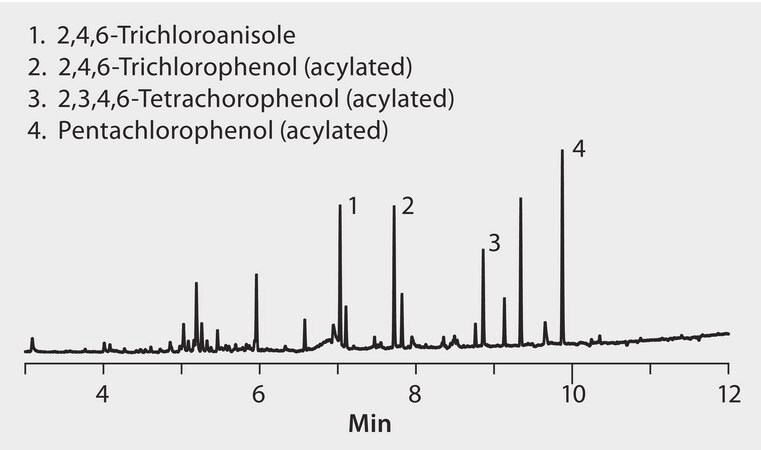GC Analysis of Trichloroanisole (TCA) and Precursors on SLB®-5ms after SPME using 100 μm a PDMS Fiber

Materialien
Analytische Säule
SPME-Faser
CONDITIONS
sample/matrix
each analyte at 100 ng/L in a 12% ethanol solution
SPME fiber
metal fiber coated with 100 μm PDMS (57928-U)
extraction
headspace, 50 °C for 30 min, with stirring
desorption process
250 °C for 3 min
column
SLB-5ms, 30 m x 0.25 mm I.D., 0.25 μm (28471-U)
oven
50 °C (1 min), 25 °C/min to 280 °C
inj. temp.
250 °C
detector
GC/MS, ECD, 290 °C
carrier gas
helium, 1.5 mL/min, constant
injection
splitless/split, closed 2 min
liner
0.75 mm I.D. SPME
sample
Wine cork
Beschreibung
Hinweis zur Analyse
2,4,6-Trichloroanisole (TCA) is a phenolic compound that, if present, gives wine an unpleasant odor often described as musty, woody, dank, and acrid. Human sensory thresholds for TCA are very low, estimated to be approximately 5 parts per trillion. Natural phenolic compounds in cork can convert into TCA when the cork is exposed to chlorine-containing bleach. TCA contamination can also derive from fungi growing on the grapes during fermentation. In this application, a 100 μm PDMS fiber was used to extract TCA from the headspace above a spiked wine sample prior to analysis by GC. The SLB-5ms GC columns provide consistently low-bleed, inert, efficient, and durable separations.
Rechtliche Hinweise
SLB is a registered trademark of Merck KGaA, Darmstadt, Germany